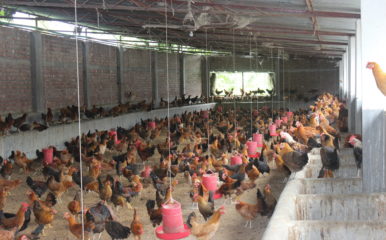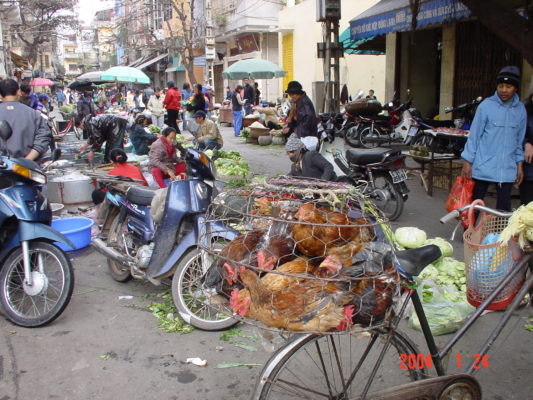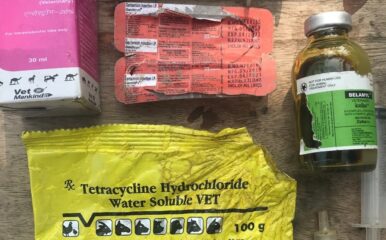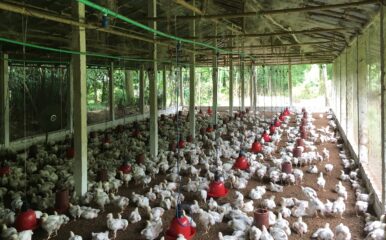
Cooperation and collaboration in tackling AMR in Vietnam
Published on 20/07/2020

NIVR
Antibiotics were discovered in the early years of the 20th century, bringing about a turning point in the history of human medicine. They continue to save millions of people’s lives every year and contribute to the prevention of animal diseases. However, the natural selection process of bacteria and the improper use of antibiotics in people – including insufficient and over dosing, mis-prescribing and the abuse of antibiotics in the health service – as well as inappropriate use of antimicrobials in agriculture, is leading to increasing antibiotic resistance in pathogenic bacteria (bacteria that cause disease).
The result is antimicrobial resistance (AMR) and it threatens the health and livelihoods of people in Vietnam and elsewhere as medical costs, economic and social impacts, and the burden of disease and mortality from drug resistance increase. AMR also damages the sustainability of agricultural and food production systems, as well as the environment.
At the National Institute of Veterinary Research (NIVR) in Vietnam, we are involved in a number of projects and research activities, which contribute to the implementation of our country’s National Antimicrobial Resistance Plan. For example, earlier this year we participated in the development of a Vietnam technical working group on antimicrobial resistance prevention and control in the agriculture sector in Vietnam. This was just a recent example of our work in this area.
NIVR also participates in quarterly and annual technical meetings to develop the national AMR surveillance programme, and also contributes to the AMR surveillance programme’s sampling and laboratory protocols.
Following the G20 Health Ministers’ meeting in Berlin in 2017, the Vietnamese Ministry of Health and Ministry of Agriculture and Rural Development developed a National Action Plan on combating drug resistance over the period 2013-2020. Vietnam was one of the first six countries in the Asia Pacific region to do so.
The National Action Plan has five specific objectives:
- Reviewing, revising and enforcing regulations and policies related to AMR and antimicrobial use in animal and aquaculture production.
- Raising awareness of antimicrobial use and the risk of AMR among technicians and professionals in agriculture and food, as well as among farmers and consumers.
- Encouraging people to apply good practices in medical examination and treatment, in feed production, and in animal and aquaculture production.
- Monitoring the use of antibiotics, antibiotic residues and antibiotic resistance in livestock production and aquaculture.
- Facilitating interdisciplinary cooperation in the management of antibiotic resistance.
To implement the Plan effectively, the Ministry of Agriculture and Rural Development appreciated the importance of coordinated actions, not only among its affiliated units but also with the Ministry of Health, the Ministry of Industry and Trade, the Ministry of Natural Resources and Environment, and the Provincial People’s Committees.
The Ministry of Agriculture and Rural Development called for cooperation, and technical and financial support, from international organisations, research institutes and the private sectors to join our efforts to minimise antibiotic use and take action against AMR threats. As a result, an agreement on multidisciplinary commitment to drug resistance prevention and control was signed in June 2015 by the four ministries involved, as well as by the World Health Organization (WHO), the Food and Agriculture Organization (FAO), the Oxford University Clinical Research Unit (OUCRU), CIRAD, the French Agricultural Research Centre for International Development, and other development partners. The Government of Vietnam has received great support from these international organisations in the human resources, finance and technical areas.
Over the past five years, research on antibiotic resistance has been one of our Institute’s priority areas for key projects funded by international organisations. These include two projects funded by the Fleming Fund, the ‘Engaging the food and agriculture sectors in sub‐Saharan Africa and South and South‐East Asia in the global efforts to combat antimicrobial resistance using a One Health approach 2017- 2019’ and ‘Surveillance of Antibiotic Resistance Bacteria 2019-2021’. The Danish International Development Agency (DANIDA) has funded the ‘Health and Antibiotic in Vietnamese Pig Production’ project.
Through these projects, we provide direct support to the National Steering Committee on AMR, in particular the Sub-Committee for Agriculture. The areas we cover include problem-solving workshops, updates and sharing information, policy orientation related to antibiotic resistance and antibiotic residues surveillance in animal and aquaculture production, research on management and use of antibiotics in real production, and developing guidelines on use of antibiotics for livestock farmers, technicians and people working in animal and aquaculture production in general.
Our achievements to date include raising awareness, strengthening surveillance capacity, promoting good practices and using antibiotics properly in agriculture and food systems. Farmers, veterinarians and drug sellers, among others, now recognise the importance of fighting against AMR. As a result, they use antibiotics appropriately and find alternative solutions to maintaining livestock health and productivity, such as improving biosecurity and implementing better practices in animal production.
NIVR has also carried out research activities on AMR. Three of our laboratories have carried out active surveillance programmes on AMR in bacteria in livestock value chains: the microbiology department works on infectious microorganisms, especially zoonotic bacteria; surveillance of foodborne pathogens is implemented in the veterinary hygiene department; and subtypes of antimicrobial resistant bacteria are identified and conserved in the gene conservative department. NIVR also supports provincial laboratories on testing for AMR with effective results.
Under the proper attention of the Vietnam government and with the support of international organisations, NIVR is significantly contributing to the national action plan on antimicrobial resistance and assisting in that fight.


